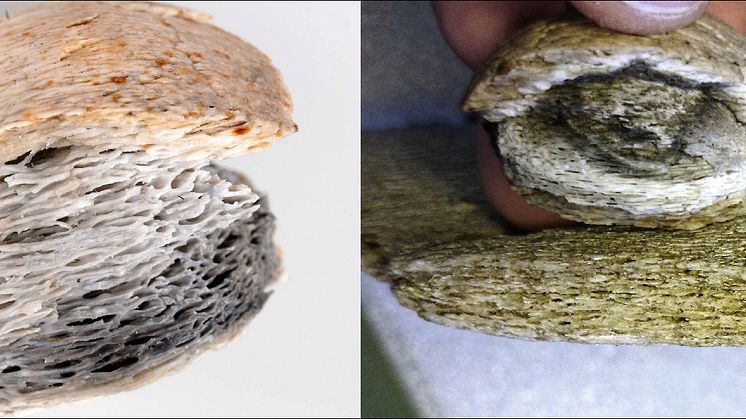Press release -
Large-scale whaling in north Scandinavia may date back to 6th century
The intensive whaling that has pushed many species to the brink of extinction today may be several centuries older than previously assumed. This view is held by archaeologists from Uppsala and York whose findings are presented in the European Journal of Archaeology.
Museum collections in Sweden contain thousands of Iron Age board-game pieces. New studies of the raw material composing them show that most were made of whalebone from the mid-6th century CE. They were produced in large volumes and standardised forms. The researchers therefore believe that a regular supply of whalebone was needed. Since the producers would hardly have found the carcasses of beached whales a reliable source, the gaming pieces are interpreted as evidence for whaling.
Apart from an osteological survey, species origin has been determined for a small number of game pieces, using ZooMS (short for Zooarchaeology by Mass Spectrometer). The method shows that all the pieces analysed were derived from the North Atlantic right whale (Eubalaena glacialis), a massive whale weighing 50–80 tonnes. It got the name because it was the right whale to hunt: it swam slowly, close to shore, and contained so much blubber as to float after being killed.
Whalebone gaming pieces appear at the same time as production features for blubber and large boathouses were multiplying in northern Norway. The gaming pieces were probably made in this region, from where they were transported south and ultimately used as burial gifts in Sweden.
The origins of large-scale whaling in northern Europe have long been shrouded in mystery. Written sources refer to whaling on a large scale during periods corresponding to the Viking Age in Scandinavia. Ninth-century sagas about the Norwegian merchant Ohthere/Ottar (a guest and informant at the court of King Alfred the Great) mention his extensive hunt for large whales, but these stories have long been controversial as factual sources.
The gaming pieces not only indicate early whaling. To the archaeologists, they are an important component in research on extensive early trading networks. These were well-functioning several centuries before the formation of towns in Viking times. The new study, along with several other archaeological studies over the past few years, shows increasingly substantial exploitation of marine resources, and also of inland resources in northern Scandinavia. In a supplementary in-depth study, the results will also be used to study human influence on the marine ecosystems in relation to whale population trends, since it is now realised that the inception of large-scale whaling took place further back in time than was previously known.
For more information, please contact:
Andreas Hennius, doctoral/PhD student at the Department of Archaeology and Ancient History, Uppsala University, email: Andreas.hennius@arkeologi.uu.se tel: + 46 (0)70 393 01 98
John Ljungkvist, researcher at the Department of Archaeology and Ancient History, Uppsala University, email: John.ljungkvist@arkeologi.uu.se
Andreas Hennius, Rudolf Gustavsson, John Ljungkvist and Luke Spindler (2018) Whalebone Gaming Pieces: Aspects of Marine Mammal Exploitation in Vendel and Viking Age Scandinavia, European Journal of Archaeology, https://doi.org/10.1017/eaa.2018.15 (Open access)
Topics
Uppsala University -- quality, knowledge, and creativity since 1477
World-class research and outstanding education of global benefit to society, business, and culture.
Uppsala University is one of northern Europe's highest ranked academic institutions. www.uu.se

